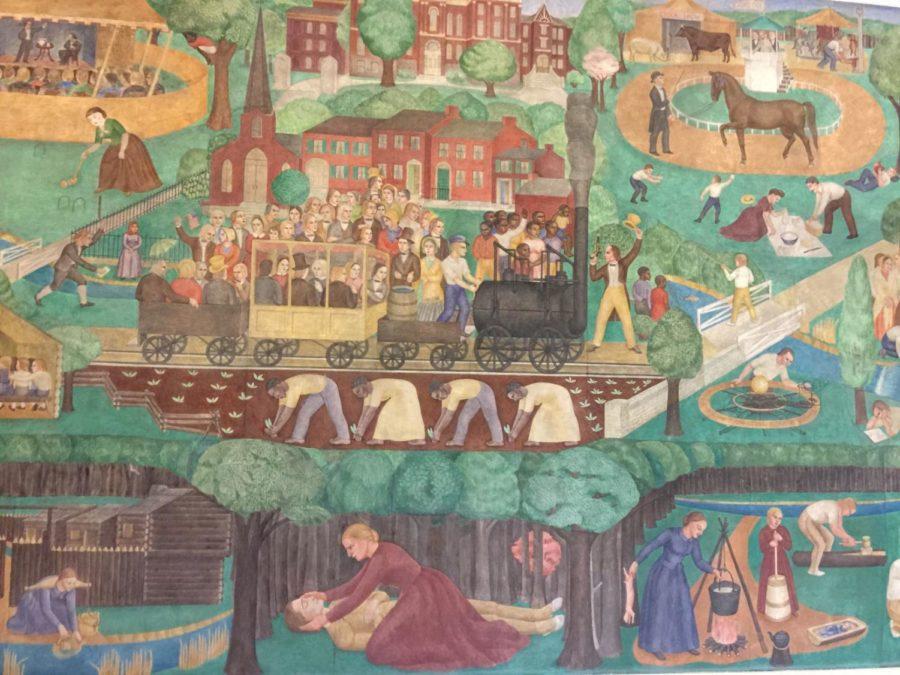Wendell Berry: Mural becoming overly politicized
December 3, 2015
Though I willingly would do so if it were possible, I cannot understand the University of Kentucky’s decision to hide Ann Rice O’Hanlon’s fresco in Memorial Hall. The reason given is only that it shows people doing what they actually did. Black people did work in tobacco fields. Black musicians did play for white dancers. Indians did seriously threaten the settlers at Bryan’s Station.
Ann Rice O’Hanlon was a native of Lexington. She graduated from the University of Kentucky in 1930. She spent most of her life in Marin County, Calif. She taught art for many years at Dominican College in San Rafael, where her students were of several races. She was the sister of Dee Rice Amyx, wife of Clifford Amyx, once a professor in the art department of the University of Kentucky. My wife, Tanya Amyx Berry, is a niece of Ann Rice O’Hanlon, whom I therefore knew well and for many years. Ann was a liberal, if anybody ever was – too liberal, in fact, to approve entirely of me. I never heard her utter one racist word.
Related: Editorial: UK should find middle road for Memorial Hall mural
Ann painted the Memorial Hall fresco in 1934, when it took some courage to declare so boldly that slaves had worked in Kentucky fields. Nobody would have objected if she had left them out. The uniform clothing and posture of the workers denotes an oppressive regimentation. The railroad, its cars filled with white passengers, seems to be borne upon the slaves’ bent backs – exactly as the railroad near Walden Pond, according to Henry David Thoreau, was built upon the backs of Irish laborers.
I don’t believe Ann Rice O’Hanlon would willingly have painted “a painful and degrading personification of a false, romanticized rendering of our shared history.” I don’t think she did. I don’t think, to quote President Eli Capilouto again, that “the mural provides a sanitized image of that history” or that her “artistic talent actually painted over the stark reality” of slavery.
The president further objects to the fresco on the ground that it reminds “one black student . . . that his ancestors were slaves.” That statement has at least two arresting implications: (1) that black students should not ever be reminded that their ancestors were slaves, and (2) that white students should not ever be reminded that their ancestors were slave owners. Do students, then, study history at our “flagship university” in order to forget it?
See also: Future uncertain for Memorial Hall’s controversial mural
Perhaps President Capilouto is not an art critic or a historian, and so his defamations should be excused as the misshapen eloquence of overcooked political correctness. But Anna Brzski is “a UK art history professor,” and her remarks cannot be so easily dismissed. As an art historian, Professor Brzski ought to know better than to equate the O’Hanlon fresco with “statues of Lenin and Marx” in the once-communist countries of Eastern Europe. Either she does not know or is afraid to say that the relevant analogue is the official suppression in those countries, under communism, of all art that did not meet official standards.
If forgetting history is now the purpose of higher education, I may be taking some risk by reminding the flagship censors of the persecution of Boris Pasternak by Soviet officials when Dr. Zhivago was published in the West and awarded the Nobel Prize. I will go further into danger and remind them also that Thomas Merton wrote a brilliant appreciation of that novel and its author. Among much else of value Merton said this: “It is characteristic of the singular logic of Stalinist-Marxism that when it incorrectly diagnoses some phenomenon as ‘political,’ it corrects the error by forcing the thing to become political.”
The fresco in Memorial Hall was, in its origin and in itself, not political. Now, by the singular logic of the university’s official righteousness, it has been forced to become political.
Wendell Berry has written more than 40 books of fiction, poetry and essays, and has farmed in Henry County for more than 40 years, according to his website, wendellberrybooks.com.




























































































































































